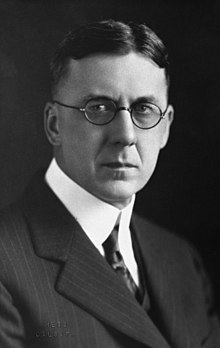
Back Cargo de primer ministro de John Edward Brownlee Spanish Governo de John Edward Brownlee Portuguese
 | |
| Premiership of John Edward Brownlee November 23, 1925 – July 10, 1934 | |
| Monarch | George V |
|---|---|
| Cabinet | Brownlee ministry |
| Party | United Farmers |
| Election | 1926, 1930 |
| Appointed by | William Egbert |
|
| |
John Edward Brownlee was Premier of Alberta, Canada, from 1925 to 1934 as leader of the United Farmers of Alberta (UFA) caucus in the Legislative Assembly of Alberta. After a number of early successes, his popularity and his government's suffered from the hardships of the Great Depression. In 1934, he was embroiled in a sex scandal when a family friend sued him for seduction. Though Brownlee denied the events she alleged, when the jury found in her favour he announced his resignation as premier.
Brownlee became premier on November 23, 1925, when, at the request of the UFA caucus, he took over from the indecisive Herbert Greenfield, in whose cabinet he had served as attorney-general. After winning the 1926 election for the UFA, Brownlee achieved a number of successes. In 1929 he signed an agreement with the federal government that transferred control of Alberta's natural resources to its provincial government, which had been a priority of his three immediate predecessors as premier. In 1928 he divested the government of the money-losing railways it had acquired after the syndicates that founded them went out of business, by selling them to Canadian Pacific and Canadian National. This was part of his program to balance the provincial budget, at which he was successful beginning in 1925. His government also introduced a controversial sexual sterilization program to prevent the mentally disabled from procreating.
His government's fortunes entered a decline following the 1930 election. Agricultural prices collapsed, throwing many of Alberta's farmers into abject poverty. Urban unemployment shot up, and the government had no choice but to return to deficit spending. Brownlee tried to broker deals between farmers and banks, but found neither side eager to compromise. Political radicalism increased, as communism, the new Co-operative Commonwealth Federation, and William Aberhart's social credit movement gained new adherents. The UFA itself elected as its president radical socialist Robert Gardiner. In 1933, Prime Minister R. B. Bennett named Brownlee to the Royal Commission on Banking and Currency as a representative of western interests and unorthodox viewpoints. In this capacity, Brownlee travelled the country questioning witnesses, especially bankers and farmers. While he concurred with the commission's ultimate recommendation for the creation of a central bank, he also made a series of recommendations of his own, including that the central bank be controlled entirely by the government.
In 1934 Brownlee was sued for the seduction of Vivian MacMillan, a family friend and a secretary in his government's attorney-general's office. MacMillan claimed that she and Brownlee had carried on an affair for three years. Though Brownlee denied MacMillan's story completely, and though his lawyer exposed inconsistencies in cross-examination, the jury sided with MacMillan. In deference to public outrage over the charges, John Brownlee resigned as premier July 10, 1934, and was succeeded by Richard Gavin Reid.